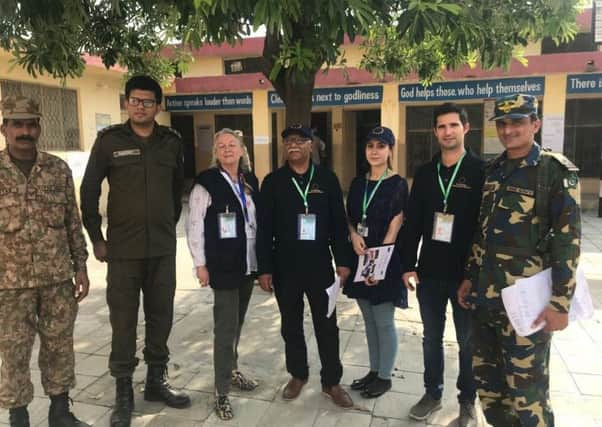Amjad Bashir: Hold Imran Khan to account on deeds '“ not how he won in Pakistan


The culprits, we were told, were backers of the eventual winner – the former cricket great Imran Khan.
The fact is, however, that although the election process was by no means perfect, it was fairer and more transparent than many in the developing world. Certainly there were no shortcomings so drastic as to skew the outcome significantly.
Advertisement
Hide AdAdvertisement
Hide AdAdmire him or not, Imran Khan won the election fair and square, He must now be held to account not on how he won power but on whether he delivers his promised reforms.
How do I know it was broadly fair and inclusive? Because I was there - not as a participant but as part of a team of impartial observers from the European Parliament.
There were seven of us MEPs from a range of political groups who went out to Pakistan two days before the vote. Nearly 100 more EU officials had been out there as observers for many weeks ahead of the election. Other teams were there too, including one from the Commonwealth.
On voting day we split into three groups and went to different polling stations across the country. These were pre-agreed in discussions with the electoral commission because of security considerations, but we were firm in having our say on the sort of paces we wanted to be.
Advertisement
Hide AdAdvertisement
Hide AdMy colleague and I were in place at our first station at 7.30am – half an hour ahead of the polls opening. It was in the capital Islamabad and we also visited stations in neighbouring Rawalpindi.
There was a strong army presence at all the polling stations we saw. That might concern some people, but the voters I spoke to all said they were reassured by the presence of soldiers to provide security. The soldiers were prominent but not intrusive. They closely watched everything that happened – but said and did nothing.
Every political party was also represented and had the opportunity to voice concerns should they have them. At one station I visited, an agent claimed votes for his candidate had been put into a different bundle. It was opened and flicked through – he was reassured.
We were concerned that one particular traditional practice was still being followed. This saw voters approaching representatives of their chosen political party as they arrived at the polling station, then being checked off against a register and receiving slips with the relevant voting symbol.
Advertisement
Hide AdAdvertisement
Hide AdIt was as if party officials were doing the tasks which we in the UK would expect of polling officers – with the consequent risk of undue influence being applied.
However voters were still free to cast their ballot in private as they chose. This is how voting has been done since independence. Frankly, it needs to change to negate all suspicion of potential pressure.
But it was the same system for all parties and I could not say that it produced any meaningful sway on where votes were cast one way more than any other.
It warmed my heart to see such large queues to vote. A large proportion of women too, and some stations had separate polling rooms for females.
Advertisement
Hide AdAdvertisement
Hide AdOne new rule implemented by the electoral commission this time was that every constituency must have at least 10 per cent of its votes come from women, or the result would not stand. None had to be voided.
Votes were counted where they were cast. No trucks taking ballot boxes to central counting halls, but votes counted and bundled on the floor of the school house – it usually was a school house – where they had been cast earlier in the day,
The counts and results were witnessed by all participants, then photographed and ideally “what sapped” or texted to the central count.
At the count where I was –back in Islamabad – the internet failed because of volume traffic, so instead the photograph was pinned to the door and the result transmitted by phone.
Low-tech, maybe, but transparent and fair.
Advertisement
Hide AdAdvertisement
Hide AdTo put it bluntly – during the voting and the counting I witnessed – the opportunity for jiggery-pokery with ballot papers was zero.
This election was not perfect but broadly fair. More importantly, this was the third election in a row in Pakistan where there has been a reasonably fair contest and an internationally-accepted outcome.
At the last election, the total number of voters was 54 million. After a major registration drive, a staggering 104 million cast their votes last month.
Democracy is really starting to catch on in the country of my ancestors.
It needs to be encouraged, and not undermined by disproportionate criticism.
Amjad Bashir is a Conservative MEP for Yorkshire and the Humber.